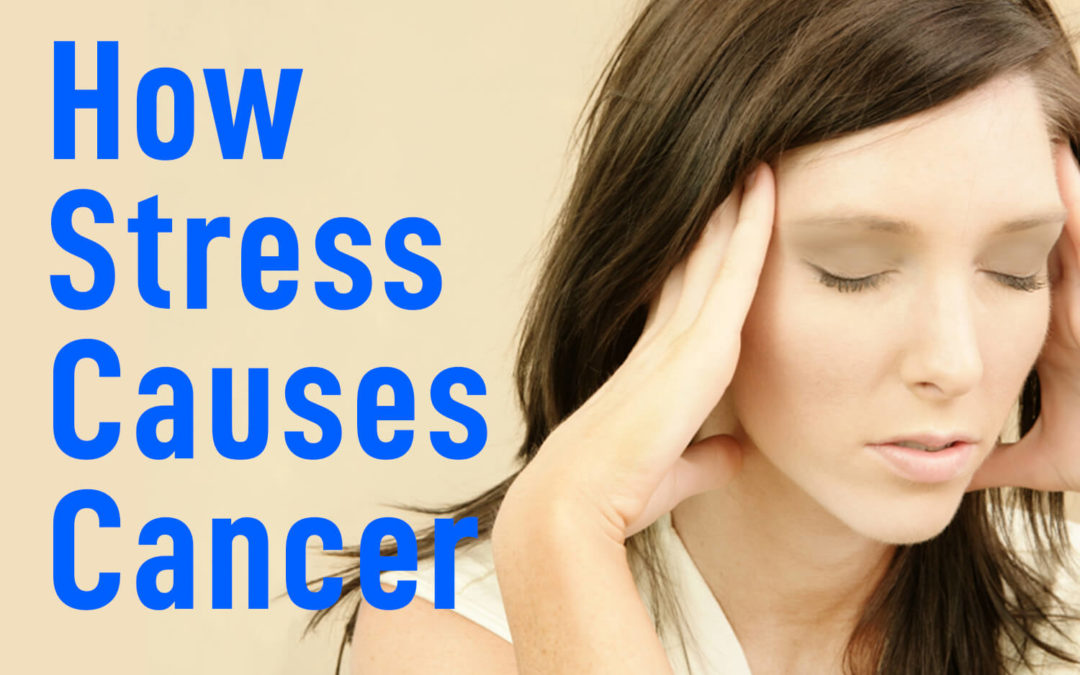Does Stress Cause Cancer?
How did I develop cancer? How did “this” happen to me? I eat pretty well . . . was it something I ate?
Was it the alcohol I drank? My aunt had breast cancer; it must run in the family. Maybe it’s some toxin that I was exposed to and unaware of . . . that must be it.
Perhaps these are some of the thoughts that ran through your head after getting the news you have/had breast cancer.
To help you process your thoughts so you can wrap your mind around an unnerving diagnosis, here are some facts you need to know.
You are absolutely correct in thinking that a high-calorie, nutrient-deficient diet is a cause of cancer. In fact, it’s the single biggest cause of all cancers.
Cancer all in the Family?
Does cancer run in the family?
Well, not really.
Even though genes are passed down, they don’t just all of a sudden turn against you.
Unless . . . you push them to do so. The reality is, genes are sets of codes that are programmed for specific functions. In normal states of health, when the internal terrain of the body is communicating with genes, the genes produce specific proteins that create normal function within the body.
However, if the internal terrain of the body is unhealthy, the genes often fail to function normally, and cancer is a result.
Are you toxic? Aren’t we all?
Toxins in our foods, water, and the environment have been shown to damage DNA—the initial step in the development of cancer. It’s hard to say whether the toxins you’ve been exposed were the cause of your cancer.
However, if you were a smoker or continue to smoke, or you are bombarded with tons of herbicides, pesticides, or chemicals from plastics, there’s a good probability those chemicals were linked to the development of your cancer.
Let’s not forget free-radical damage (oxidative stress) that can damage the cells’ DNA, setting the stage for cancer. I would be remiss not to mention immune dysfunction and inflammation that cause, and drive, the cancer process.
This is an important topic for another conversation—or blog.
What about stress? Our busy lives are filled—and I mean filled—with deadlines, frustrations, and demands. We are bombarded with stressful events and stories from the crazy news media all day long. We all have family and relationship drama. We deal with ailing children, parents, and grandparents. The loss of a loved one, including a pet, is very stressful.
What about the cost of college, and a home mortgage? Healthful food is now becoming a financial burden. Let’s not forget career changes and job loss. Don’t forget divorce. Look, we live in stressful times; for many people, constant high stress is a way of life.
Stress. OK, how bad can it be?
At the busiest time of my career, I discovered that a trusted employee was stealing from me and her insurance company to support a very well-hidden drug habit—heroin addiction.
The FBI got involved in an investigation that then reported to me that this employee had stolen tens of thousands of dollars! On top of my office hell, my long-term relationship turned sour.
Dealing with stress both at the office and at home—day after day, week after week, month after month—became the norm. I had sleepless nights, and often would drink red wine to medicate myself to sleep. My gut twisted daily as my mind conjured up visions of my practice ending along with losing a new home that was in the middle of renovations.
I plugged along in the office and at home, but I kept my thoughts and emotions bottled up, my usual “MO.” It never occurred to me that stress could contribute to a life-threatening situation.
As time passed, I began to feel more tired, as though I had the flu or was fighting an infection. In combination with fatigue, I began to get major headaches when bending over, which I’d never had before.
One night I was awakened by sheet-drenching night sweats.
I was startled to feel the bed soaked, as if someone had hosed me down in the middle of the night. Now, I knew something was seriously wrong. I had blood work done and requested an x-ray of my chest. The blood work revealed that a biomarker associated with tissue damage was through the roof.
As I viewed the x-rays with a radiologist, he pointed to the film and said, “You have a giant tumor in your chest.” We often hear stress is dangerous, but here was the disturbing proof.
Can your stress and the ensuing stress reaction have caused your cancer?
The answer is Yes.
Emotional and physical stressors cause a physical reaction in the body called the stress reaction—the “fight-or-flight” response.
The stressor can be physical (infection, toxin, trauma) or emotional (abuse, anger, guilt, fear, loss of a loved one). The stress reaction is the body’s way of preparing itself for “fight or flight.”
Stress becomes a health hazard only when stressors are constant and the physical stress response doesn’t stop. When we don’t return to a normal pre-stress set point, the result is disease. When the body is under stress, it releases the stress hormones cortisol, adrenaline, and norepinephrine.
All three hormones play a major role in the development and progression of cancer.
Here’s the frightening proof that stress causes cancer. The development and progression of cancer is a multi-step process that involves the cells’ DNA, the immune system, nutrients, inflammation, free radicals, and certainly hormones.
A study published in Nature Reviews found stress hormones can compromise DNA repair, leading to the development of cancer.
In many cases of cancer, DNA gets damaged and, for a multitude of reasons, the cell can’t repair its DNA. Cancer is the result.
Cortisol, adrenaline, and norepinephrine were all found to suppress the arm of the immune system responsible for destroying cancer. Research in The Lancet found the suppression of specific immune cells, called Natural Killer cells, caused tumor development.
Cortisol, adrenaline, and norepinephrine interfered with the function of Natural Killer cells. Data out of the Journal of the National Cancer Institute states patients who had abnormal cortisol levels throughout the day also had suppression of natural killer cells, leading to more rapid disease progression in those with breast cancer.
Adrenaline and norepinephrine were found to increase blood vessel development to tumors—a process called angiogenesis—allowing cancer cells and tumors to feed themselves. With proper nutrients and oxygen, cancer cells become immortal.
Last, these stress hormones were shown to favor the process of metastasis.
Metastasis is the mechanism where cancer cells break off from a primary tumor and end up in other parts of the body, setting up the development of more tumors.
Metastasis is made much worse and becomes extremely dangerous under the influence of stress hormones. Cancer Research demonstrated epinephrine not only suppressed the immune system from killing cancer cells on the move, it allowed cancer cells to migrate and move into other areas of the body with ease.
From the onset and development of cancer to increased growth and proliferation, the development of blood vessels to the tumor, and then dangerous metastasis, these stress hormones play a huge role in all stages of cancer.
The evidence is clear . . . stress and the stress reaction cause cancer. Stress is inevitable, isn’t it?
You can’t get rid of it, but you can change your perception of it as it occurs, and by doing so, you reduce the stress reaction and the release of stress hormones.
So what can you do to minimize the stress reaction? You can try these tools to reduce the stress reaction, ultimately preventing cancer and other chronic illness associated with long-term stress. They work for me and my patients; hopefully, these tools will work for you.
- Change your perception of the stressor. Life is filled with frustration, pain, disappointment, and unpredictability. You can’t change what’s coming your way, but you can change your perception of the stressor. Remember, there is always a blessing when there is a major stressful event. Try to see the blessing in a stressful or emotionally traumatic situation. By doing so, your perception will change.
- Relax and meditate. Chill out! Relaxation is the opposite of stress. You can begin to relax by sitting quietly and breathing slowly—a form of meditation. Engage in some form of relaxing activity like yoga or whatever you find enjoying and relaxing. Believe it or not, my relaxation is jumping on my motorcycle and riding it through the rolling hills and twisties of the mountains of Vermont.
- Eliminate negativity. This is what I call “pulling the weeds.” Get rid of those around you that bring negative energy. Create thoughts that build you up and give you abundance. Focus on situations you can control, and get rid of negative people and talk in your life.
- Eat healthful food. When I’m feeling stressed, I typically lose my appetite. Some people binge eat as a way to feel better. Although I may not feel like eating, I make sure I’m eating frequent healthful meals and snacks to help minimize the release of cortisol. If your not eating enough nutrients, your cortisol will rise to help manage your blood sugar. Not good.
- Get some exercise. Research shows that regular exercise reduces stress hormones. Choose one exercise or multiple activities like fast walking, running, bicycling, weight training, boot-camp training, skiing, stair climbing—whatever gets your heart and muscles pumping.
- Guided Active Breathing™. A new method of therapy has emerged that combines traditional talk therapy with guided breathing, while surrounded by relaxing and emotion-provoking music to help in the “emotional retraining” session. The method involves a skilled professional who gives breathing instructions (which involves you actively) while helping you process through your stressors and hidden emotions or memories through talk and soft touch. As a composer conducts an orchestra, the coach guides you through the session, instructing you on the depth and speed of breath while helping you process your thoughts and emotions, until you uncover, process, and pull out that stuck mental splinter.
For more information on Guided Active Breathing™, check out beinbliss.com.
For more information on the controllable causes of cancer, and how stress hormones are linked to all stages of cancer development, get yourself a copy of REBUILD “Stress kills” is not just a statement thrown around at the local coffee shop.
The stress reaction and its hormones can and will ignite and drive cancer, as well as other chronic disease.
References
Antoni, M. H., Lutgendorf, S. K., Cole, S. W., et al. (2006). The influence of bio-behavioral factors on tumour biology: Pathways and mechanisms. Nature Reviews, 6, 241.
Sephton SE, Sapolsky RM, Kraemer HC et al. Diurnal cortisol rhythm as a predictor of breast cancer survival. Journal of the National Cancer Institute 2000;92:994–1000


Recent Comments